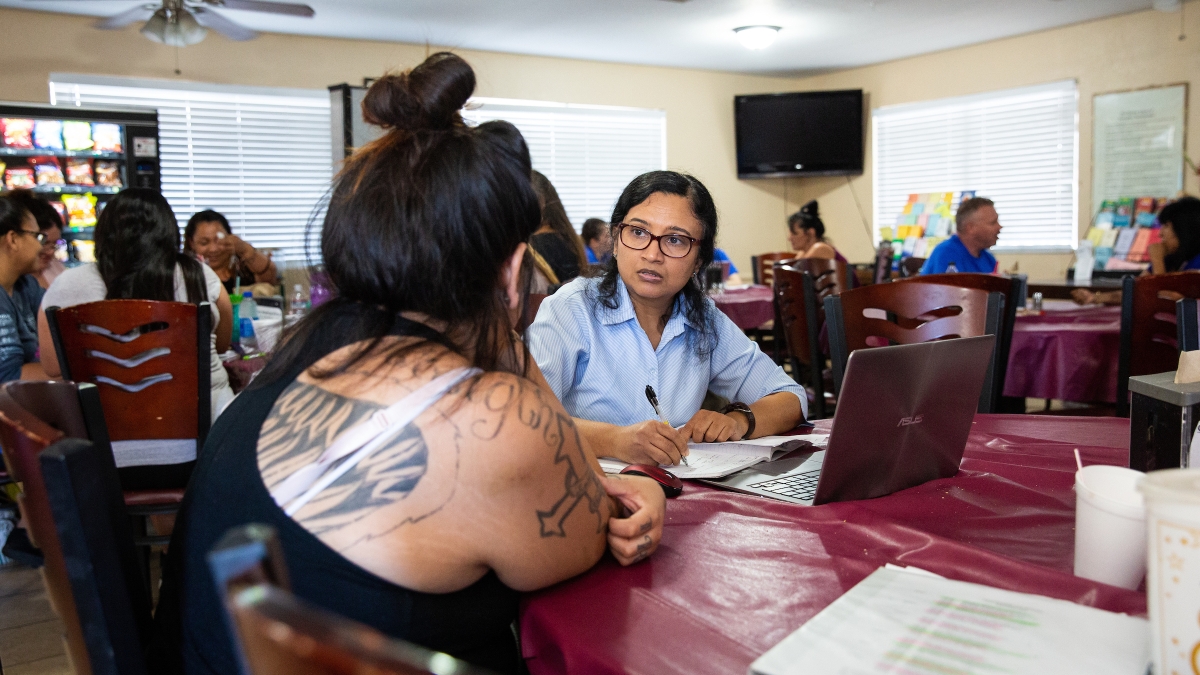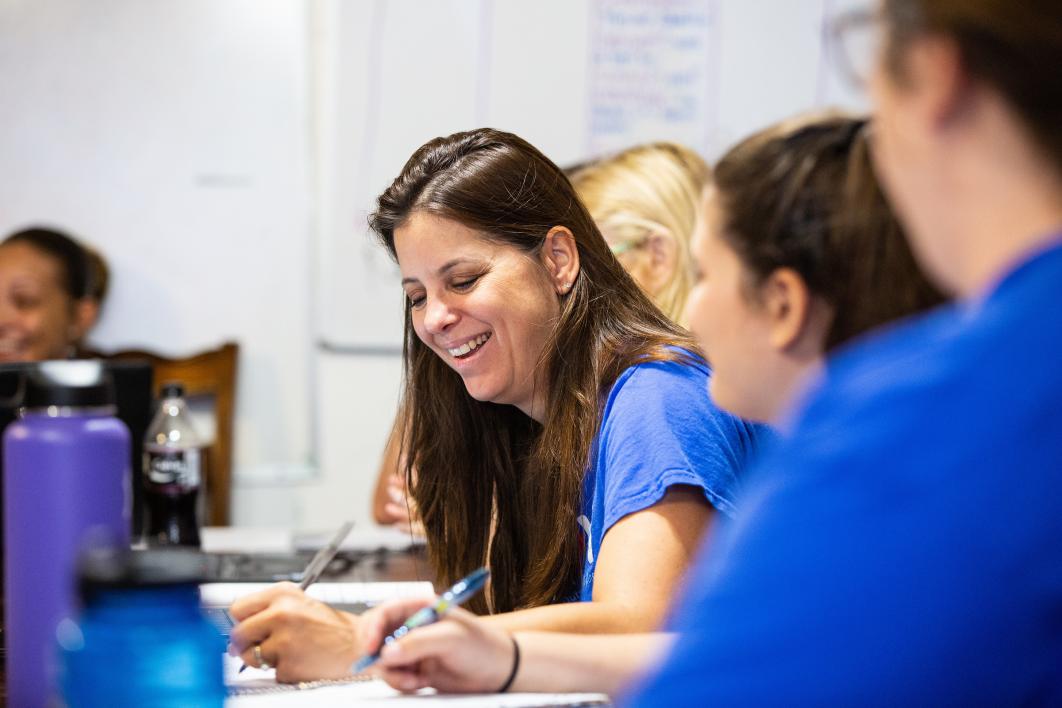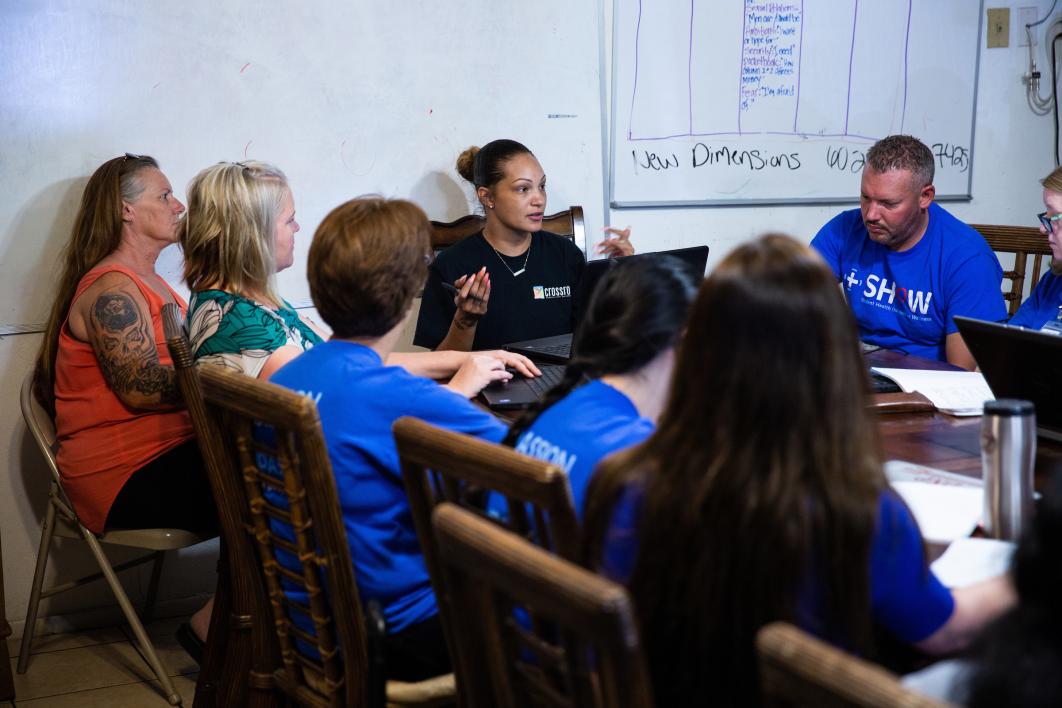As the opioid epidemic in America rages on, many treatment facilities struggle to meet the health needs of freshly sober individuals, leaving them no option but to seek medical care outside the facility, increasing their likelihood to relapse.
At Crossroads for Women in Phoenix, that’s no longer a concern. In February 2016, the residential treatment center partnered with the Student Health Outreach for Wellness (SHOW) community initiative, a tri-university, student-run program serving vulnerable populations.
Over those two years, students from Arizona State University, Northern Arizona University and the University of Arizona have served over 700 patients and given about $95,000-worth of free services at Crossroads. As a result, both length of stay and patient satisfaction have increased, and medical-related incident reports have fallen to zero.
The partnership is supported by the National Center for Interprofessional Practice and Education at the University of Minnesota, and was funded through the Robert Wood Johnson Foundation, the John A. Hartford Foundation, the Josiah Macy Jr. Foundation and the Gordon and Betty Moore Foundation.
“I am so pleased that this partnership has been impactful to both SHOW and Crossroads,” said Liz Harrell, assistant clinical professor at ASU’s College of Nursing and Health Innovation and director of SHOW.
ASU assistant clinical professor Liz Harrell laughs as the team takes notes on the day's cases during the morning huddle of the Student Health and Outreach Wellness clinic at Crossroads residential and outpatient substances abuse treatment program in Phoenix. Photo by Deanna Dent/ASU Now
“SHOW students and faculty are engaged in ‘real-world’ interprofessional care delivery and learning about how to care for those recovering from substance-use disorders. Crossroads residents are recipients of integrated care not usually available in residential settings. … We could not have asked for a better collaborative outcome.”
Crossroads program coordinator Jenice Johnson agrees. She described the improvement in quality of care provided to patients as “amazing and drastic.”
Before she was employed at Crossroads, she was a patient there. After only a week at the facility, she developed a case of bronchitis and had to leave to seek treatment at a hospital.
“That was probably one of the scariest experiences I had,” Johnson said.
She’s grateful patients don’t have to worry about being in that kind of situation anymore.
“With SHOW being here and (the patients) being able to talk to somebody who cares and can help them get care, it’s kind of just a mind ease,” she said. “And it also helps with … somebody being two days sober and having to leave by themselves on the bus to go to the emergency room and then not returning. Or returning high.”
SHOW was founded as a service-learning program to provide health care to individuals who lack the means to get it themselves, including those experiencing homelessness, those from low-income communities and those recovering from substance use.
Video by Deanna Dent/ASU Now
The gap in care is the result of a broken system in which health care is tied to employment, Harrell said.
“If you don’t have an employer that offers health care or you’re out of a job, you’re also out of luck,” she told ASU Now in 2016, and maintains that that’s still the case two years later.
In addition, Harrell said, the systems is “fundamentally disjointed.”
That’s why SHOW uses what’s called an interprofessional practice health care delivery method, meaning students from multiple disciplines — including nursing, psychology and social work — work together to provide more holistic care to patients.
Nikole Sciortino, a social work senior, chose to work with SHOW to fulfill her field internship requirement precisely for that reason.
“I get to work with different disciplines, and that’s really important being in my field because we do a lot of referrals, and we have to know certain signs (someone might exhibit) before we refer a client to another person,” she said.
For example, an individual in recovery might be inclined to lie about their substance use, but a social worker might not be able to suss them out without insight from a colleague trained in psychology.
The cross-benefits don’t just happen between students, though. Johnson has noticed how interactions between students and Crossroads employees have resulted in better patient care as well.
“Before this, I didn’t have any medical knowledge,” she said. “And I know for a lot of the students, they don’t have any knowledge of substance abuse. So us being able to learn from each other … (has produced vast improvements).”
Crossroads women's program coordinator Jenice Johnson gives advice on how to approach a patient during the morning huddle. Photo by Deanna Dent/ASU Now
Crossroads currently operates six facilities in the Valley. By January 2019, the goal is for SHOW to have a presence at all of them. Right now, SHOW supplies the facility with a family nurse practitioner, a psychiatric nurse practitioner, social workers and physical therapists, and plans to add legal experts soon.
SHOW is also in the process of building a shared clinic with Crossroads that will employ community providers as well as faculty to continue the service-learning model for students.
“Ultimately, we’re a learning lab where students learn how to work with other disciplines to provide care for a patient,” Harrell said.
Other student-run free clinic programs across the country have taken notice, adapting signature concepts from SHOW, such as a “patient navigator,” someone who stays with the patient throughout their entire clinic visit, acting as their health advocate and ensuring important information is accurate and passed along to the right care providers.
Several SHOW students have developed and implemented new strategies or initiatives as academic research projects while working at Crossroads. Every single one has been adopted at the facility, including a mindfulness education group.
The experience is invaluable, and not something you get from most internships, Sciortino said.
“It gives people like me, an undergrad, the opportunity to really take the lead on something. I’ve had different leadership positions before but this time I really feel like I’m in charge of stuff,” she said.
“I feel like I’m getting the best type of experience I can because it’s all hands-on learning. … I’m actually getting to experience the situation myself and having to do the problem solving on my own, which is a key part of the field internship so that I know what I’m doing when I graduate.”
Top photo: ASU doctoral student in advanced nursing practice Reena Pathak asks her patient questions during their morning meeting at the Student Health and Outreach Wellness clinic at Crossroads residential and outpatient substances abuse treatment program in Phoenix. Photo by Deanna Dent/ASU Now
More Health and medicine

New study seeks to combat national kidney shortage, improve availability for organ transplants
Chronic kidney disease affects one in seven adults in the United States. For two in 1,000 Americans, this disease will advance to kidney failure.End-stage renal failure has two primary…

New initiative aims to make nursing degrees more accessible
Isabella Koklys is graduating in December, so she won’t be one of the students using the Edson College of Nursing and Health Innovation's mobile simulation unit that was launched Wednesday at Arizona…

Reducing waste in medical settings
Health care saves lives, but at what cost? Current health care practices might be creating a large carbon footprint, according to ASU Online student Dr. Michele Domico, who says a healthier…




